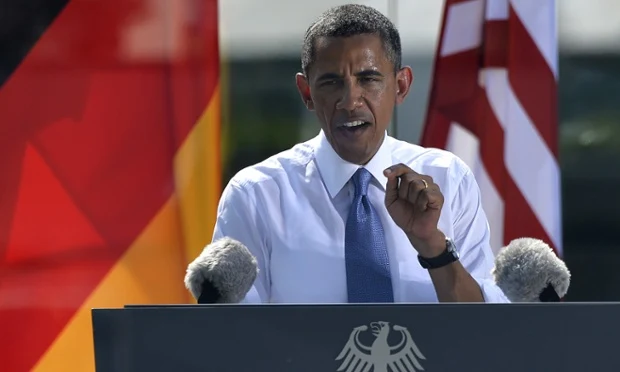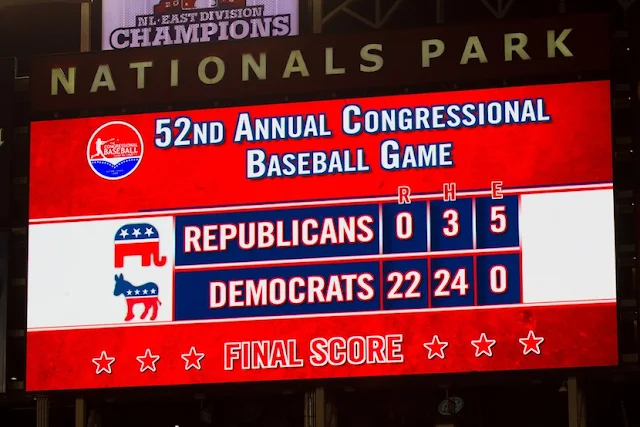Update: President Obama's speech on the climate crisis is now scheduled for Tuesday, June 25.
President Obama spoke at the Brandenburg Gate in Berlin, joining with Chancellor Merkel in marking an anniversary of President Kennedy's famous Berlin speech in 1963. "His pledge of solidarity -- “Ich bin ein Berliner” -- echoes through the ages," Obama noted, then added: "But that’s not all that he said that day. Less remembered is the challenge that he issued to the crowd before him: “Let me ask you,” he said to those Berliners, “let me ask you to lift your eyes beyond the dangers of today” and “beyond the freedom of merely this city.” Look, he said, “to the day of peace with justice, beyond yourselves and ourselves to all mankind.”
Obama's speech made news first of all for what he said about reducing nuclear weapons, which was one of the signal issues of JFK's last years as President, and the realm of one of his most significant accomplishments, the Nuclear Test Ban Treaty. "After a comprehensive review, I’ve determined that we can ensure the security of America and our allies, and maintain a strong and credible strategic deterrent, while reducing our deployed strategic nuclear weapons by up to one-third. And I intend to seek negotiated cuts with Russia to move beyond Cold War nuclear postures."
Obama spoke of other problems that exist in Europe as they do in America, particularly income inequality and poverty (another issue that the Kennedys often asserted as priority). But President Obama identified the greatest and now most urgent global problem, especially for the young and future generations, in a way that President Kennedy might have as well.
"With a global middle class consuming more energy every day, this must now be an effort of all nations, not just some. For the grim alternative affects all nations -- more severe storms, more famine and floods, new waves of refugees, coastlines that vanish, oceans that rise. This is the future we must avert. This is the global threat of our time. And for the sake of future generations, our generation must move toward a global compact to confront a changing climate before it is too late. That is our job. That is our task. We have to get to work."
But a global compact is not all that's needed. To even lead towards one, the United States must show how serious it is. In this speech President Obama also said: "In the United States, we have recently doubled our renewable energy from clean sources like wind and solar power. We’re doubling fuel efficiency on our cars. Our dangerous carbon emissions have come down. But we know we have to do more -- and we will do more."
In that regard, stories have been appearing for the past few days about President Obama getting set to announce new initiatives to confront the climate crisis. The New York Times reported Wednesday:
Heather Zichal, the White House coordinator for energy and climate change, said Wednesday that the president would announce climate policy initiatives in coming weeks. Another official said a presidential address outlining the new policy, which will also include new initiatives on renewable power and energy efficiency, could come as early as next week. Ms. Zichal said none of the initiatives being considered by the administration required legislative action or new financing from Congress.
The Times story led with a "senior officials" suggesting that President Obama will propose new regulations limiting CO2 emissions from existing power plants. Other stories note that the EPA still hasn't issued final regulations on new power plants, which could also be part of a package.
Some are speculating however that these announcements may come as counterweight to final approval of the tar sands oil pipeline. A decision on that is expected to be announced within the next month.
But for the moment the significance might well be the focus that President Obama can bring to the absolute necessity of strong, multiple and intentional efforts to cut and end global heating emissions and other steps to address both the causes and effects of the climate crisis. A Bloomberg report from a few days earlier cites a Palo Alto gathering where President Obama is quoted as saying: "We’re not going to be able to make those changes solely through a bunch of individual decisions,” he said at a June 6 event hosted by Flipboard Chief Executive Officer Mike McCue. “Government is going to have a role to play.”
When President Kennedy outlined his agenda in his Inaugural he warned that it would not be accomplished in a hundred days, "or a thousand days, or in the lifetime of this administration--But let us begin." In the speech that reignited negotiations with the Soviet Union for a limited nuclear test ban treaty (which he made in that same summer of 1963), he spoke of future dangers--like nuclear proliferation--and of future hopes. The years of treaties and nuclear weapons control and reduction have all sprung from that speech. He began.
That treaty broke the ice of the Cold War and allowed limiting and someday eliminating nuclear weapons to become a legitimate political goal, a topic for open and serious discussion in which advocates were no longer marginalized, and a vision of the future. We can only hope we're going to see history repeat itself when President Obama next talks about the climate crisis.














